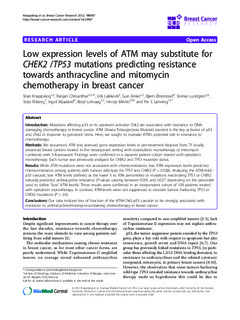| dc.contributor.author | Knappskog, Stian | |
| dc.contributor.author | Chrisanthar, Ranjan | |
| dc.contributor.author | Løkkevik, Erik | |
| dc.contributor.author | Anker, Gun Birgitta | |
| dc.contributor.author | Østenstad, Bjørn | |
| dc.contributor.author | Lundgren, Steinar | |
| dc.contributor.author | Risberg, Terje | |
| dc.contributor.author | Mjaaland, Ingvil | |
| dc.contributor.author | Leirvaag, Beryl | |
| dc.contributor.author | Miletic, Hrvoje | |
| dc.contributor.author | Lønning, Per Eystein | |
| dc.date.accessioned | 2019-10-17T12:31:16Z | |
| dc.date.available | 2019-10-17T12:31:16Z | |
| dc.date.created | 2012-09-25T14:22:20Z | |
| dc.date.issued | 2012 | |
| dc.identifier.citation | Breast Cancer Research. 2012, 14 (2:R47), . | nb_NO |
| dc.identifier.issn | 1465-5411 | |
| dc.identifier.uri | http://hdl.handle.net/11250/2622795 | |
| dc.description.abstract | Introduction
Mutations affecting p53 or its upstream activator Chk2 are associated with resistance to DNA-damaging chemotherapy in breast cancer. ATM (Ataxia Telangiectasia Mutated protein) is the key activator of p53 and Chk2 in response to genotoxic stress. Here, we sought to evaluate ATM's potential role in resistance to chemotherapy.
Methods
We sequenced ATM and assessed gene expression levels in pre-treatment biopsies from 71 locally advanced breast cancers treated in the neoadjuvant setting with doxorubicin monotherapy or mitomycin combined with 5-fluorouracil. Findings were confirmed in a separate patient cohort treated with epirubicin monotherapy. Each tumor was previously analyzed for CHEK2 and TP53 mutation status.
Results
While ATM mutations were not associated with chemo-resistance, low ATM expression levels predicted chemo-resistance among patients with tumors wild-type for TP53 and CHEK2 (P = 0.028). Analyzing the ATM-chk2-p53 cascade, low ATM levels (defined as the lower 5 to 50% percentiles) or mutations inactivating TP53 or CHEK2 robustly predicted anthracycline resistance (P-values varying between 0.001 and 0.027 depending on the percentile used to define "low" ATM levels). These results were confirmed in an independent cohort of 109 patients treated with epirubicin monotherapy. In contrast, ATM-levels were not suppressed in resistant tumors harboring TP53 or CHEK2 mutations (P > 0.5).
Conclusions
Our data indicate loss of function of the ATM-Chk2-p53 cascade to be strongly associated with resistance to anthracycline/mitomycin-containing chemotherapy in breast cancer. | nb_NO |
| dc.language.iso | eng | nb_NO |
| dc.publisher | BMC | nb_NO |
| dc.rights | Navngivelse 4.0 Internasjonal | * |
| dc.rights.uri | http://creativecommons.org/licenses/by/4.0/deed.no | * |
| dc.title | Low expression levels of ATM may substitute for CHEK2/TP53 mutations predicting resistance towards anthracycline and mitomycin chemotherapy in breast cancer | nb_NO |
| dc.type | Journal article | nb_NO |
| dc.type | Peer reviewed | nb_NO |
| dc.description.version | publishedVersion | nb_NO |
| dc.subject.nsi | VDP::Medisinsk genetikk: 714 | nb_NO |
| dc.subject.nsi | VDP::Medical genetics: 714 | nb_NO |
| dc.source.pagenumber | 12 | nb_NO |
| dc.source.volume | 14 | nb_NO |
| dc.source.journal | Breast Cancer Research | nb_NO |
| dc.source.issue | 2:R47 | nb_NO |
| dc.identifier.doi | 10.1186/bcr3147 | |
| dc.identifier.cristin | 946523 | |
| dc.description.localcode | © 2012 Knappskog et al.; licensee BioMed Central Ltd. This is an open access article distributed under the terms of the Creative Commons Attribution License (http://creativecommons.org/licenses/by/2.0), which permits unrestricted use, distribution, and reproduction in any medium, provided the original work is properly cited. | nb_NO |
| cristin.unitcode | 194,65,15,0 | |
| cristin.unitcode | 1920,12,0,0 | |
| cristin.unitname | Institutt for klinisk og molekylær medisin | |
| cristin.unitname | Kreftklinikken | |
| cristin.ispublished | true | |
| cristin.fulltext | original | |
| cristin.qualitycode | 1 | |

